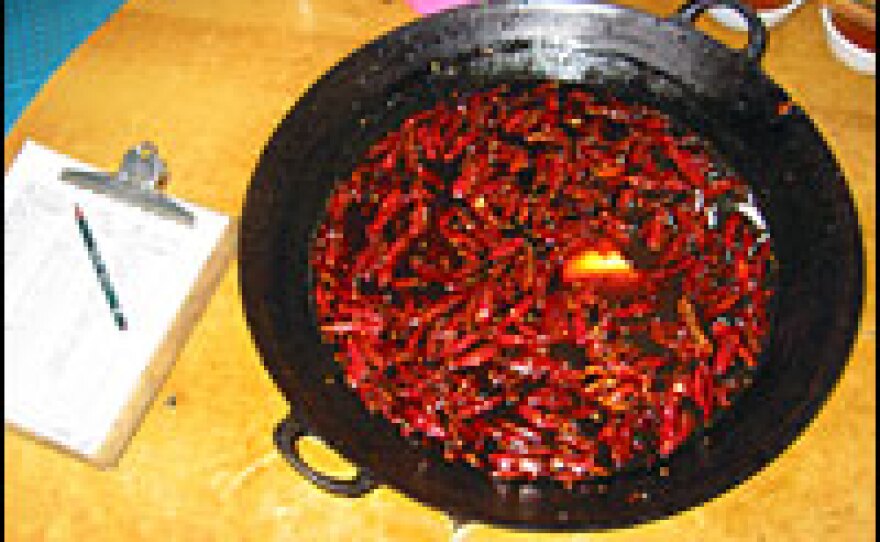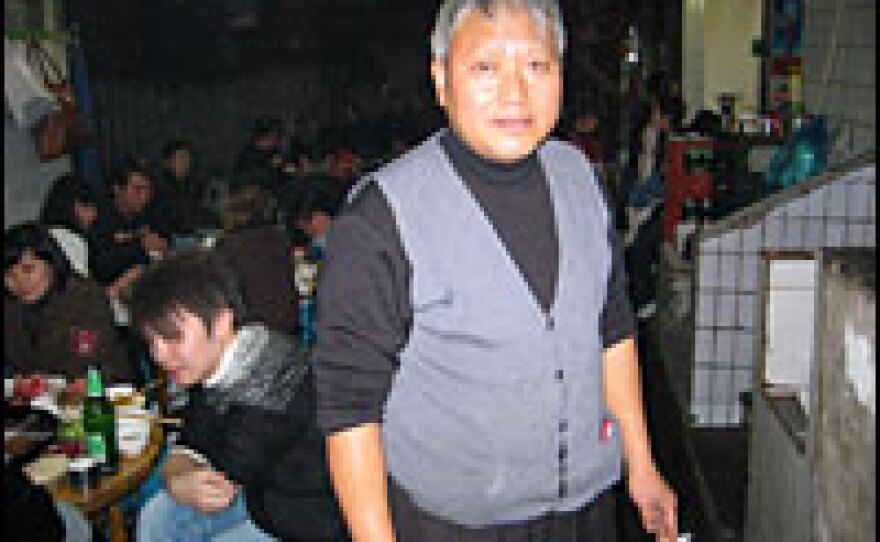

Over the years, Sichuan (also spelled "Szechwan") restaurants, with dishes such as Kung Pao chicken and spicy Ma Po tofu, have become familiar fixtures on the American dining scene.
But these eateries usually don't offer hot pot, which is an indispensable part of the cuisine in Sichuan itself. When eating Sichuan-style hot pot, you dunk meat and vegetables in peppery boiling oil, as opposed to water or broth, which is used in Beijing-style hot pot.
Hot pot is said to be the creation of Yangtze River boatmen who would prepare the meal over a fire on the river's edge. It is a signature dish in Chongqing, a mountainous city on the Yangtze in southwest China. While Chongqing has many hot pot chains, native chefs will tell you that it's the smaller, family-run hot pot restaurants that draw the real connoisseurs.
Of these, the Zhao Er Hot Pot Restaurant is one of the most popular, and has been pleasing guests for about two decades. The owner, Zhao Zhenshuan, is the second son in his family — hence the restaurant's name, "Second Son Zhao's Hot Pot." A trip will reward adventurous diners with an authentic culinary and cultural experience.
That authenticity begins with the decor — or the lack thereof. Dining takes place in unadorned, concrete rooms that open up onto an alleyway — or on formica tables set up in that alleyway under a plastic tarp.
A server fires up the gas stove at each table and puts on it a wok with canola oil, chilies and dividing grids so that diners can have their own zone in which to dunk ingredients — which are ordered a la carte.
Chongqing diners go for meat with distinctive textures and flavors, such as cow throat, congealed duck blood, yellow eels, pork kidneys and duck intestines, just to name a few. More conventional ingredients include tender beef fillets and ham sausage. There aren't many vegetables in the mix, besides a few scallions, tofu sheets and bean sprouts for texture.
To my surprise, Zhao told me that he sources his chili peppers not from Sichuan, but from northern Hebei province, which he claims produces more fragrant peppers. Another key ingredient in the brew is the Sichuan pepper known as hua jiao, or prickly ash. This gives the food the numbing and tingling effect that distinguishes it from Hunan food and other spicy cuisines. It may also make you feel that you've got electric lips and a mouth that is fully prepared for root canal surgery.
After cooking each piece of meat or vegetable, you dip it in a bowl of sesame oil, which cools it down fast and adds another distinct fragrance. On each table, you'll also find a cup of chopped garlic and another of MSG — to add to your individual bowl in case you find it all too bland.
As the liquid in the wok simmers, the chilies release more of their spice into the oil, creating a creeping crescendo of spicy heat. You can try the local beers, but they're of limited use as fire extinguishers.
Joining a couple of young Chinese professionals for dinner, I sampled the various viscera on offer. They all tasted much better than they looked. And despite my aging pipes, I was not blown away by the peppery heat, and suffered no ill after-effects.
At first, I was a bit wary of this kind of hot pot after hearing about the oil that's used. Some time after midnight, after all the guests have left, Zhao explains, he carefully filters the oil to rid it of all solids, and then boils it at high heat to sterilize it. He insists it's perfectly sanitary. But more important, he adds, the oil and chili brew is the secret of hot pot's fresh and fragrant taste.
"Taste is everything," he states emphatically. The son of former butchers, Zhao says he has tried to teach dozens of apprentices to get the brew right, but without success. So Zhao still prepares each wokful himself, just the way he learned from a chef friend of his father.
Zhao has three restaurants in an old lane where the county magistrate's office used to be in imperial times. The menu is all in Chinese, so some pointing and grunting may be required. But you won't leave hungry, or particularly poorer: A substantial meal for me and two dining companions totaled less than $7.
There's often a long line of people waiting for tables at dinner — including the occasional group of intrepid foreigners — so reservations are usually necessary.
Zhao Er Hot Pot Restaurant — No. 53 Ba Xian Yamen, Chongqing, China. Telephone: 86-23-6671-1569 or 86-1310-125-7539. Open year round for lunch and dinner except Chinese New Year.
Copyright 2022 NPR. To see more, visit https://www.npr.org. 9(MDAzMjM2NDYzMDEyMzc1Njk5NjAxNzY3OQ001))







